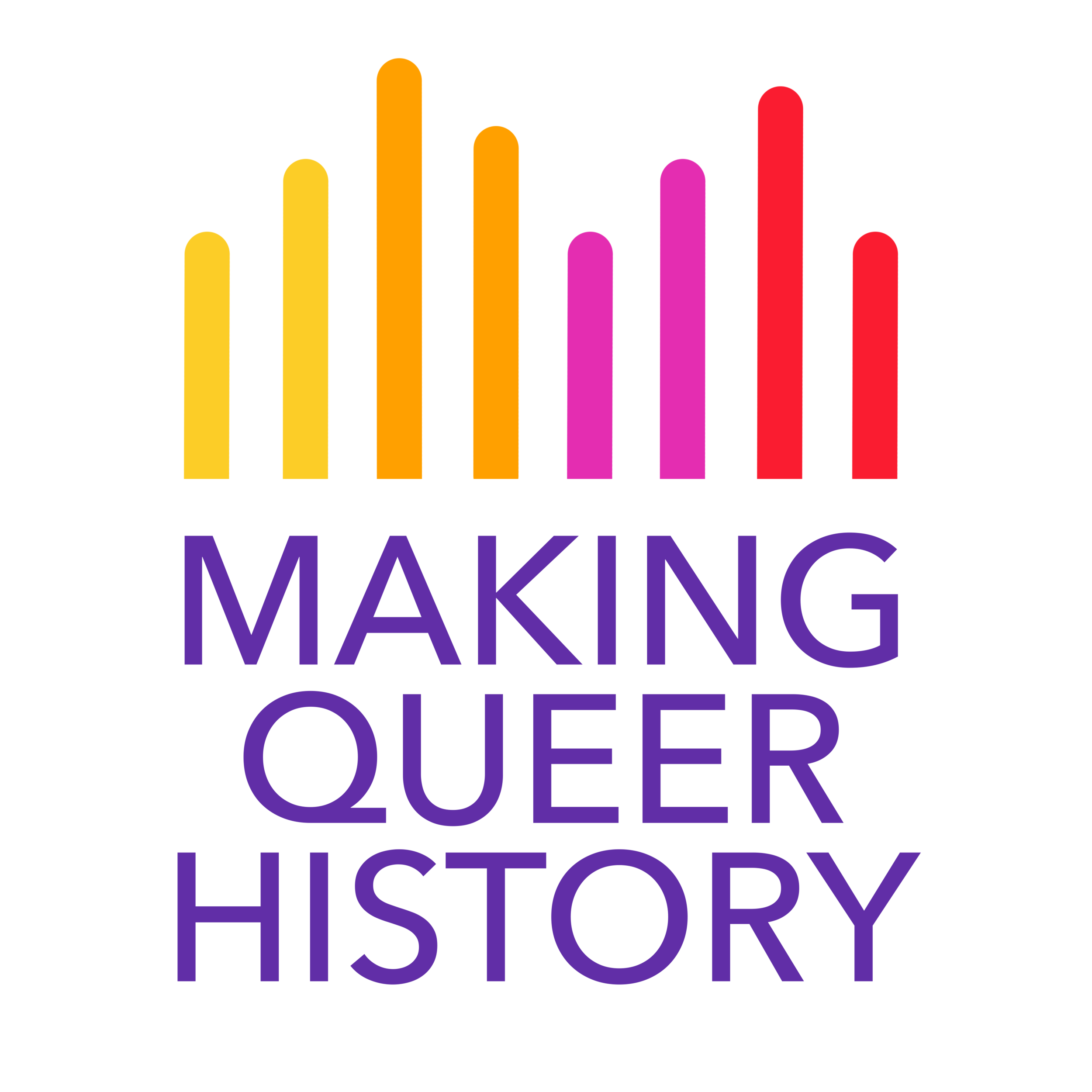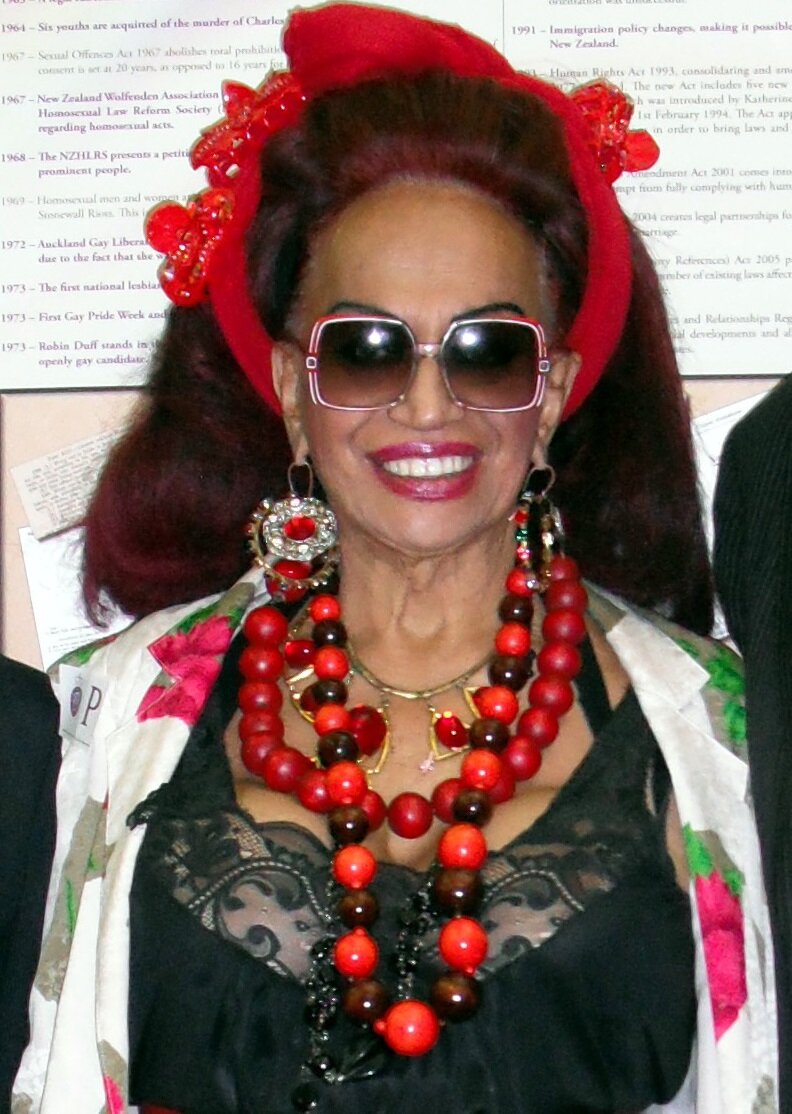Carmen Rupe, a Māori woman with long brown hair wearing a red headpiece, red bead necklaces, red and white earrings, and sunglasses. She smiles.
"As soon as I heard about the drag shows opening there I said 'bye bye men's clothes'. I've never put anything on since. Never."
– Carmen Rupe
An iconic drag queen from New Zealand, Carmen Rupe was known for many things. An activist, runner of a brothel, politician, and performer, her life was a full one. Though the people within her community were very fond of her, and she is remembered as one of the great game-changers of the time, she was not completely well-liked. Police and politicians both had, at best rocky relationships with the woman, and at worst, violently hated her and all she stood for. Despite all the obstacles set up for her to trip over, Carmen was able to live to the relatively old age of seventy-five before she died of kidney failure.
Born on October 10th, 1936, Carmen was one of thirteen children her mother had but was able to maintain a close relationship with her. Her family being Maori she was raised surrounded by Maori culture and language. She seemed to have some idea from a young age that she did not fit into the gender that was assigned to her at birth, and like many young transgender people, she expressed herself through play, dressing up in her grandmother’s clothes often. When she was fifteen, she even performed Hula at a local celebration wearing a dress. She also was well aware of her attraction to men, though she didn’t act on the attraction much until later in her life. Her mother seemed to have accepted both of these truths and kept Carmen close until Carmen’s move to Aukland as an adult.
Soon after her move, Carmen was enlisted into compulsory military service, and it was there that she began to participate in drag performances, something that the other soldiers were not only entertained by but often encouraged. Using her medical training in the military, she was able to get a job at a hospital in Aukland.
It was there that she first began dressing in traditionally female clothing more regularily, and slowly began to transition into sex work. It was because of her job in sex work that she first adopted the name Carmen after being put on the spot and remembering the movie stars she admired and emulated growing up.
Having visited Sydney a couple of times for her job, she moved there in 1959 in reaction to her mother’s death, an event that rippled into every aspect of her life. She picked up side jobs as a nurse and later a waitress but stayed mostly with sex work. At the time, police officers were particularly violent with people they found to be sex workers and even more so with those they discovered were transgender.
She was eventually arrested in 1962, once released from jail, she inherited enough money to buy her the security she needed to begin dressing in traditionally female clothing full-time. In 1966 a police officer arrested her because of this, but when she was brought before the judge, they ruled that it was not illegal for people with legal documents that said they were male to be dressed in traditionally feminine clothing. This ruling would not only make Carmen’s life easier and make it so she never was forced to wear traditionally masculine clothing again, but it was a huge victory for transgender people throughout the country.
Carmen would go on to legally change her name, begin hormones, and get top surgery, though she decided against ever getting bottom surgery.
Moving to Wellington in 1967, Carmen opened a late-night cafe named Carmen’s International Coffee Lounge which also worked as a sex venue. To protect herself, her employees, and her clients from the police, the entrance had a confusing and intricate set of stairs. Within the establishment, they used a code with teacups and saucers to indicate what a client was looking for.
A cup placed upside down on a saucer signaled that the client was looking for a cisgender woman, a cup on the side a transgender person and a saucer on top of a cup meant a desire for a person of the same gender.
Many of the women who worked there were transgender, like Carmen, and she made a point to protect all of her employees from both the police and clients. Employing a wide variety of queer people some decided to work in the sex work side of the business while others did not, working in the kitchens and serving. Carmen was well aware of how hard it was for an openly queer person to hold down a job, and she made room in her business for as many as she could.
With much media attention given to the cafe, along with some celebrity clientele, Carmen’s business was thriving. This allowed her to open other coffee lounges in different locations, and well used to police harassment, she made a point to show newcomers to the industry the ropes.
Through all of this success, Carmen became well known in New Zealand, both because of her businesses and because of her controversies. Stating in an interview that she knew some of the MPs were queer, appearing topless at celebrations, all the while using this notoriety to begin working with charities.
This culminated in her running for mayor in Wellington, running on the platform of legalizing sex work, abortions, homosexuality, and nude beaches. Though she would not win that election, eventually, all of her initiatives would become law in New Zealand.
For the rest of her life, Carmen would be a respected member of the New Zealand and Australian queer community. Though she eventually moved on from her businesses, she still worked in sex work late in life and worked with charities until the very end.
Dying in 2011 at the age of 75, Carmen was a well-loved and well-remembered woman. Though she never had a good relationship with the police, she was able to watch the change in her country and see and be a part of some of the great strides the queer community made in her time.
Supported by her family from a young age, over and over again Carmen stepped gracefully over all the obstacles placed in her path and did so while maintaining her sense of love and empathy for the people around her.
[Disclaimer: some of the sources may contain triggering material]
Alves, T. (2018, March 21). New Zealand's 10 Most Legendary Drag Queens. Culture Trip. Retrieved from https://theculturetrip.com/pacific/new-zealand/articles/new-zealands-10-most-legendary-drag-queens/
Carmen. Directed by Geoff Stevens, performance by Carmen Rupe. 1989. Ngā Taonga Sound & Vision. ngataonga.org.nz/set/item/546
Carmen recalls Coffee Lounge glory days. (2006, April 23). Queer News Aotearoa. Retrieved from http://www.qna.net.nz/news/696.html
Carmen Rupe Memorial Trust. (2013, December 8). Carmen Rupe Tribute [Video file]. Retrieved from https://www.youtube.com/watch?v=w2mQmAVnpMg
Carmen Rupe Portrait To Joins National Gallery Collection. (2019). Express Magazine. Retrieved from https://gayexpress.co.nz/2019/09/carmen-rupe-portrait-to-joins-national-gallery-collection/
Desmarais, F. (2019, September 15). Portrait of Wellington transgender legend Carmen Rupe to join national gallery collection. Stuff Limited. Retrieved from https://www.stuff.co.nz/entertainment/arts/115780558/portrait-of-wellington-transgender-legend-carmen-rupe-to-join-national-gallery-collection
Larsen, D. (2013, March 7). Composer Jack Body on Carmen Rupe - "I was fascinated. And appalled." Metro. Retrieved from https://www.metromag.co.nz/arts/arts-music/composer-jack-body-on-carmen-rupe-i-was-fascinated-and-appalled
Lynette Townsend. 'Rupe, Carmen Tione', Dictionary of New Zealand Biography, first published in 2018. Te Ara - the Encyclopedia of New Zealand, https://teara.govt.nz/en/biographies/6r6/rupe-carmen-tione
Transgender icon Carmen Rupe dies in NSW. (2011, December 15). The Sydney Morning Herald. Retrieved from https://www.smh.com.au/world/transgender-icon-carmen-rupe-dies-in-nsw-20111215-1ovgn.html
Transgender icon Carmen Rupe remembered in National Portrait Gallery. (2016, March 31). Te Ao Maori News. Retrieved from https://teaomaori.news/transgender-icon-carmen-rupe-remembered-national-portrait-gallery


